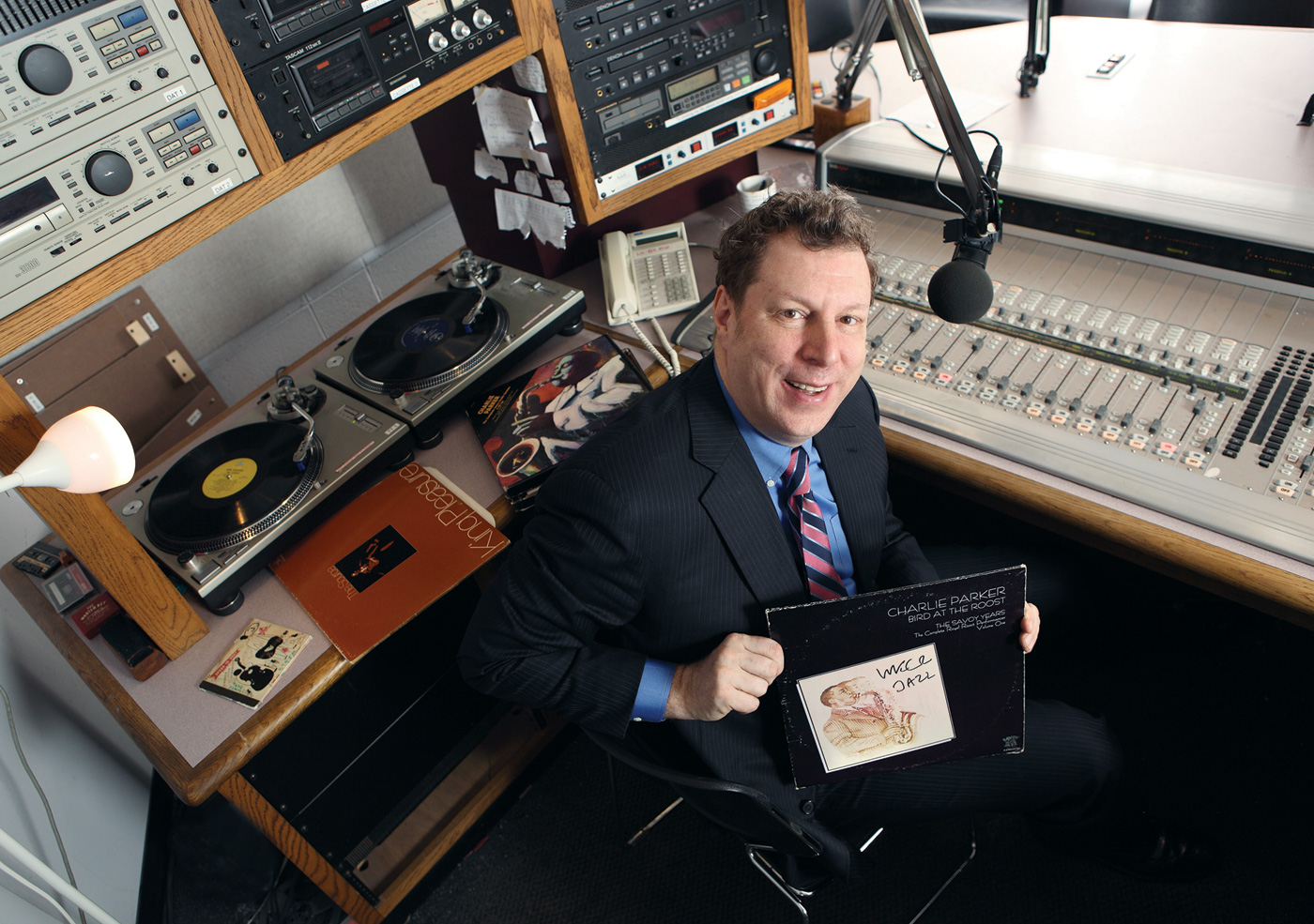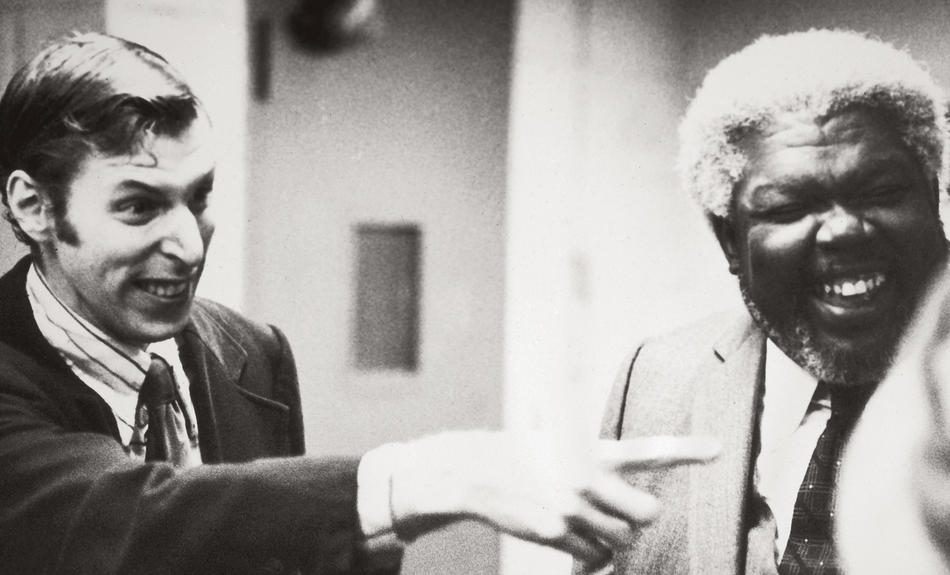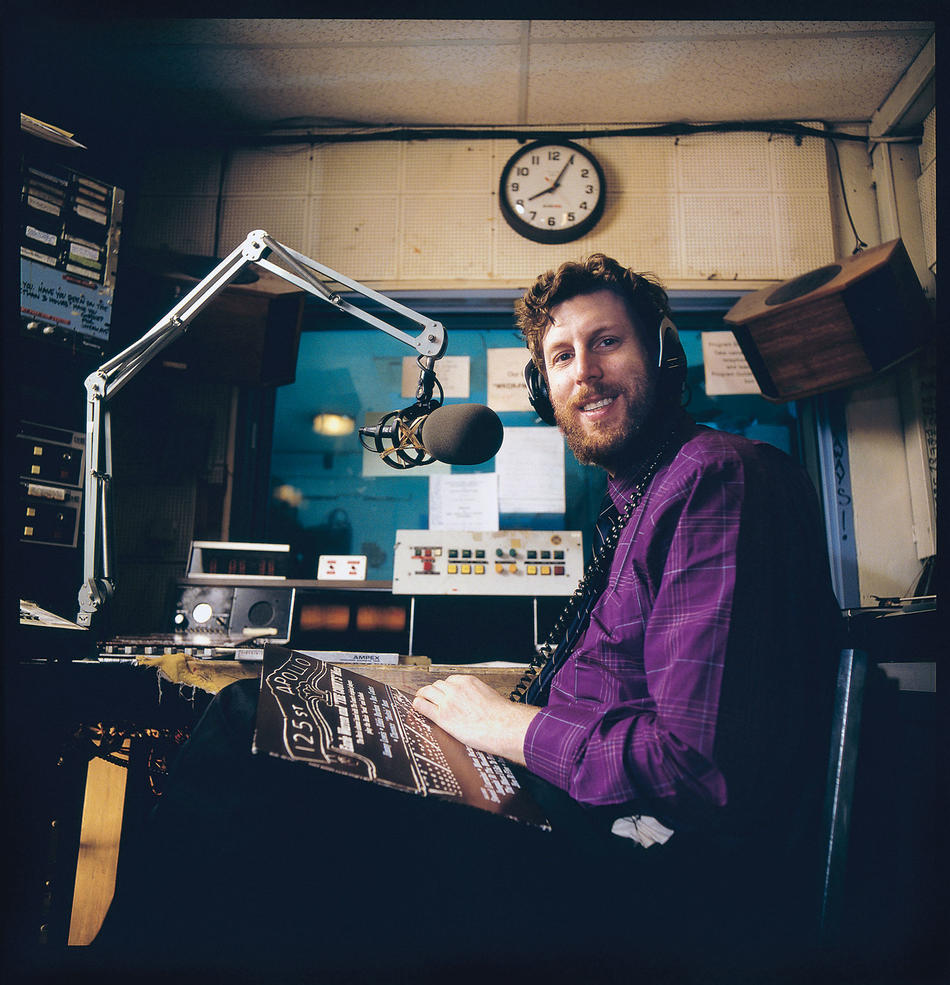
In the 1993 movie Groundhog Day, the protagonist, a broadcaster named Phil, finds himself reliving the same day, February 2, over and over again. To Phil, it’s a curse: All he wants in life is to get hired by a network so that he can quit his job as a weatherman at Channel 9 Pittsburgh, where he’s forced to do undignified things like cover Groundhog Day. Now, by some cosmic joke, he’s stuck forever in Punxsutawney.
Only, what if it’s not a curse? What if it’s a gift?
But we’re getting ahead of ourselves. Let’s flip to February 2, 2010, when a formally dressed crowd arrived at the rotunda of Low Library to honor another broadcaster, also named Phil, who joined the Columbia radio station WKCR on Groundhog Day 1970. To stretch the metaphor, this Phil never left his hole: after 40 years, he’s still on the air each weekday morning, hosting the long-running Bird Flight, a program devoted to the music and career of Charlie “Yardbird” Parker. And on Saturdays, he again boards a bus on Hillside Avenue in Queens, switches to a train at the 179th Street station, and arrives in Morningside Heights by dinnertime, to bring us Traditions in Swing.
Phil Schaap ’73CC is a New York original: a radio host, producer, archivist, educator, storyteller, a virtuoso of jazz history in general and Charlie Parker in particular, whose appearance in Low might thus be more aptly rendered in ornithological terms than in rodential ones. Schaap, tall, broad, with a wave of red hair, entered the room in a black tux, a storklike figure among the penguins (though storks are mute and Schaap is not). He shook hands, thanked the guests, chatted, ordered a Jack Daniel’s on the rocks, then headed to the bandstand, next to the dais, and greeted members of Vince Giordano and the Nighthawks, who were warming up for a night of swing.
Over by the bar, the great jazz drummer Roy Haynes, who played with Charlie Parker from 1949 to 1952, and with everyone else since, stood in dark wraparound shades and sipped a bottle of mineral water, looking a good deal younger than his 84 years. Someone asked him what his relationship was to Schaap. Haynes replied, “I woke up this morning and turned him on.” A beat. “Musically, that is.” Nearby was a lanky, bespectacled man in his 60s, a student at Swing University, the jaunty name of Schaap’s series of adult education courses at Jazz at Lincoln Center. “I’ve taken Hard Bop, the Coltrane class, and Jazz 301,” this man said. “And I applauded Phil every session.” He called Schaap a “walking encyclopedia” and said that he burns a CD of “Bird Flight” once a month and mails it to his brother-in-law in Cleveland.
In the center of the room, 12 round tables had been set up. The guests sat down to eat a $500-a-plate dinner (this was a WKCR fundraiser, starring the station’s golden goose) and to hear encomia from Schaap’s radio colleagues, including Sharif Abdus-Salaam ’74CC, the drummer Kenny Washington, Jamie Katz ’72CC, ’79BUS, and current station manager Michael Zaken ’11CC. The speakers testified to Schaap’s generosity, his warmth, his sensitivity, his humility, his devotion, his football injury freshman year, his steel trap memory, and his prodigious energy — early bird and night owl both. “He can go without sleep for months — almost,” Abdus-Salaam told the audience. “He does that so we can get as much as we can from what he has to offer.”
Eric Foner, DeWitt Clinton Professor of History and no slouch for dates, noted that the previous day, February 1, was the 50th anniversary of the Woolworth’s lunch-counter sit-in. This led to a little badminton between Schaap and his old professor over Plessy v. Ferguson, a case that arose, as Schaap observed, in New Orleans, where jazz began. (Schaap often points out that jazz, with its integrated bands and audiences, helped hasten the end of segregation.) “One of the lessons of history,” Foner said, glancing at his former student, “is that perseverance is a tremendous virtue.” Former station manager Emi Noguchi ’10CC unfurled and read aloud an Executive Chamber Citation from Governor David Paterson ’77CC that was so long and laden with “Wherebys” that it began to suggest a burlesque of its verbose subject. In contrast, tenor sax colossus Sonny Rollins, a prince of the extended solo, sent a brief and perhaps unresolved telegram, also read by Noguchi: “Dear Phil, and I say ‘dear’ because you are quite dear to our jazz community.”
A defining Schaap moment was provided by Katz, the station manager at WKCR from 1970 to 1971. He recalled the night Schaap knocked on his door at Furnald Hall to inquire about working at the station. Katz invited the tall, friendly stranger inside and gave him a blindfold test. “McCoy Tyner, Live at Newport, ‘Woody ’n You,’” Schaap answered, quickly and correctly.
Katz was impressed. But now he really wanted to stump this guy. “So I put on a record my father had done,” Katz recounted, “and Phil said, ‘That’s “Cotton Tail” by Benny Carter, off Further Definitions on Impulse Records, and on piano, Richard Aaron Katz, born in Baltimore on March 13, 1924.’” Katz paused. “My father didn’t even know his middle name.” The audience laughed knowingly, but tonight it was Schaap’s staying power, not his famous memory, that was center stage. Katz said, “You’ve heard of Pipp and Gehrig?” He hooked a thumb behind him to indicate Schaap on the dais. “That’s Lou Gehrig.”
Phil Schaap was born on April 8, 1951, and grew up in what he calls the “jazz bedroom community” of Hollis, Queens. Roy Eldridge was a neighbor and family friend. So was Lennie Tristano. So was Milt Hinton. So was Lester Young. Schaap’s father, Walter Schaap ’37CC, ’41GSAS, a French history major, went to France in 1937 as a scholar and translator and befriended the jazz musicians there. He gave English lessons to Django Reinhardt and drank with Coleman Hawkins on Bastille Day ’39. Schaap’s mother, Marjorie Alice Wood Schaap, was a classically trained pianist. Phil’s babysitter was Papa Jo Jones, Count Basie’s drummer. Jazz was what Schaap ate for breakfast. It was his milk, his bread, his baseball cards, his grandpa, his weather. He learned things early, and remembered them.
He picked up the trumpet in his teens, then put it down after college (“I knew I sucked”), and focused on his other instrument — his voice. Listening to Schaap narrate, say, the wrenching story behind Charlie Parker’s sublime and ruinous recording of “Lover Man” on July 29, 1946, one hears that this, too, is jazz: Here is an improviser with his own sonorous nasality, his own vocabulary, a master of the notes between the notes, a crafter of paragraphs delivered on coffee breath into the morning ether, a tough yet self-effacing pedant whose solos, often of Rollins-esque duration, thread their way through facts and dates and anecdotes and conjecture (“You don’t have to trust me,” he’ll say, or, “I bet some of you disagree with me,” or, “I know for some of you it’s a burden to hear a social studies lesson, but . . . ”) in their hot pursuit of Truth. He gives you not just words, but feeling, in avuncular New Yorkese — the inflections, the dramatic modulations, the crescendo and decrescendo, and the gravity with which he intones, as if reading scripture, “Charlie Parker was in no shape to play that day. His entire existence was unraveling, and there were many who were thinking the jeopardy was so severe that he would die.” A whisper. A hush. It’s the sound of awe before the splendid plumage of his subject, one that is largely of his own making. Schaap is a detective gathering evidence, a pointillist using dates for dots, an obsessive aggregator of minutiae who, in the more than 10,000 installments of Bird Flight, has constructed an audio portrait of Bird that should stand for all time.
But doesn’t he ever get tired of Charlie Parker, day after day after day?
“If something’s good to listen to, it’s good to listen to more than once,” Schaap said before the festivities at Low. “In any music of quality or depth, I find that a lifetime of listening is its own reward. It’s not a Charlie Parker thing — Bach would be the same.” And to Schaap, a history major, it’s not about the dusty past, either: In music, there are no yesterdays. Now really is the time. “All music is present tense when it’s listened to or performed,” Schaap said, echoing Stravinsky, who called music “the sole domain in which man realizes the present.” Schaap drew a parallel to sports: “The game of baseball hasn’t changed — OK, so the outcome of tomorrow’s game is different than today’s — but while it’s going on, it’s in the present. And the only way to contemplate music is in the present. That’s one of its charms.”
Still, when you play the same artist every day for almost 30 years (Bird Flight took off in 1981), the present can be precarious. Schaap’s challenge, each morning, is to acclimatize first-time listeners while keeping things fresh for the habitués. “You gotta get both audiences,” he explained. “‘I don’t know what art is, but I know what I like.’ You gotta get them. ‘I know more about this than anyone on the planet.’ You gotta get them, too. When you get both, ya done something. Rembrandt did something. Charlie Parker did something. And those people speak volumes to me.”
When the Iron Horse of WKCR was introduced, the crowd in Low rose and applauded, giving back what it could. Schaap thanked everyone for “giving me a bird’s-eye view of my own funeral,” and for “tolerating a middle-aged man who is soon to become an old man. You made me feel welcome.”
Schaap, who lives in his childhood house in Queens, among thousands of LPs and 78s, took a breath.
“I haven’t had a real life the way some of you have, and I acknowledge that,” he said. “But jazz has provided me my religion. Jazz musicians are my family. WKCR has been my home. I was there when I was 18 years old. I was there today.” A beat. “I’m going to take off tomorrow, but —”
Everyone laughed, but the poignancy of Schaap’s existence made itself felt. Here was perhaps the most knowledgeable jazz expert in the world, a cat whom Wynton Marsalis calls “an American treasure,” whom Jamie Katz calls “an idiot savant without the idiot,” a man who’s never been paid a cent during his 40 years of volunteer broadcasting at WKCR, even as he helped make the station the first name in jazz radio — and he was thanking his admirers for putting up with him.
Schaap has done much outside the booth as well. He’s been a teacher at Columbia, Princeton, and Juilliard, an audio restoration specialist, and a Grammy-winning producer and writer of liner notes. But he remains, at his core, a performer, the man behind the mic, blowing. Spinning. Swinging. Given his early associations, it’s no surprise that even his arrival at Columbia was marked by a golden stroke of time: He came a year after the strike of 1968, just as ’KCR was changing its format, expanding its jazz programming. Talk about hitting the beat. Papa Jo must have smiled.
But time, alas, can be a funny thing.
Back in Punxsutawney, things change for Phil in Groundhog Day. As February 2 recurs, Phil learns how to profit from his foreknowledge of events. He gathers data, memorizes it, uses it for personal gain. But for all his omniscience he still isn’t happy. Slowly, he begins to figure things out. He starts using his mastery to help others, and finally makes the breakthrough that allows him to graduate to February 3.
Phil Schaap faced no such difficulties this past Groundhog Day. After the Nighthawks packed away their instruments and the tables were cleared and Roy Haynes put on his hat, Schaap walked through the doors of Low Library. Outside, the nighttime snow fell light and feathery, the softest of notes. From the topmost steps of Low, the view of campus, with the buildings and trees aglow, was magical.
Schaap wasn’t ready for bed. He and about 30 undergraduates and recent ’KCR alumni headed down to the Abbey Pub on 105th Street near Broadway. It was an impromptu event, and Schaap was touched by the appreciation of people young enough to be his children.
A few days later, Schaap was asked how late he stayed out. For once, his memory failed to supply the exact time.
“All I know is that it was after midnight,” he said. “It wasn’t February 2nd anymore.”




